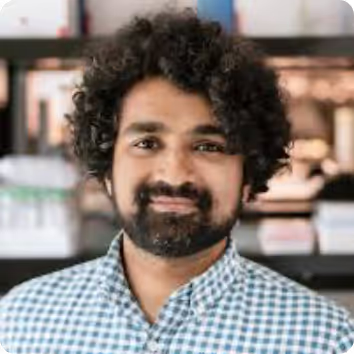Funded Research
We invest in teams of scientists who are harnessing the power of computational biology research to accelerate discoveries that will improve health outcomes for millions of people.


Computational Biology
Biswas Family Foundation empowers computational biology research, leveraging advanced data analysis, modeling, and algorithms to transform the way we study, diagnose, and treat disease. By harnessing the power of computation, we aim to accelerate discoveries that will improve health outcomes for millions worldwide.
Transformative Computational Biology Grants
In March 2024, five research teams were selected to receive funding for Biswas Family Foundation’s Transformative Computational Biology Grant Program. As part of a $15 million funding round, multidisciplinary research teams were awarded up to $1 million over two years for research using computational tools across a range of focus areas, including artificial intelligence for genomic medicine, diagnosis of cardiovascular disease, precision oncology therapies, enhancement of clinical datasets, and drug repurposing systems.
Artificial intelligence for Genomic Medicine: Circuitry, Treatment, Personalization
Principal Investigator: Manolis Kellis, PhD, Professor of Computer Science, Massachusetts Institute of Technology
Co-Investigators: Brad Pentelute, PhD, Professor of Chemistry, Massachusetts Institute of Technology, Marinka Zitnik, PhD, Assistant Professor of Biomedical Informatics, Harvard Medical School
This project aims to support the integration of single-cell and spatial sequencing with machine learning approaches to predict target genes for precision therapeutics in cancer, neuroscience, and metabolic disorders. The high-throughput interdisciplinary discovery loop will help advance biomarker selection, de novo drug synthesis, and drug repurposing, which are essential for more effective therapeutics.




A Chatbot Assistant for Genetic Diagnosis and Interpretation of Common and Rare Cardiovascular Diseases
Principal Investigator: Anshul Kundaje, PhD, Associate Professor of Genetics and Computer Science, Stanford University
Co-Investigator: Jesse Engreitz, PhD, Assistant Professor of Genetics, Stanford University
This project aims to accelerate the diagnosis of patients with cardiovascular diseases by developing an artificial intelligence chatbot interfaced with genomic knowledge bases. In the clinical diagnostic workflow, the impact of genomic mutations is unknown in many cardiovascular diseases, so chatbots with access to genomic knowledge bases populated by machine learning models trained on multiple types of data will improve the diagnostic process.



Biswas Center for Transformative Computational Cancer Biology
Principal Investigator: Katherine Pollard, PhD, Director of Data Science & Biotechnology, Gladstone Institutes
Co-Investigators: Alex Marson, MD, PhD, Barbara Engelhardt, PhD, Catherine Tcheandjieu Gueliatcha, DVM, PhD, Christina Theodoris, MD, PhD, Karin Pelka, PhD, Ryan Corces, PhD, Seth Shipman, PhD, and Vijay Ramani, PhD
This project aims to support the development of personalized diagnosis and treatment for colorectal and skin cancers. Machine learning models will be trained to predict how a patient’s genetic mutation can alter tumor cell biology to better understand the diverse pathways that drive cancer, and to evaluate the effectiveness of candidate immunotherapies for more personalized treatments.










The MAIDA Initiative: Democratizing Global Medical Imaging Data Sharing for Safer and Fairer artificial intelligence
Principal Investigator: Pranav Rajpurkar, PhD, Assistant Professor of Biomedical Informatics, Harvard Medical School
This project aims to collect medical imaging data from around the globe to facilitate the use of artificial intelligence to analyze images and improve diagnosis and treatment. The focus is on collecting chest X-rays and chest CT images for a variety of clinical settings. Developing an open data repository of medical images that is representative of diverse patient populations will help the deployment of artificial intelligence tools that are reliable, equitable, and inclusive.


CURE-Bench: Universal Benchmark for All-Disease Drug Repurposing
Principal Investigator: Marinka Zitnik, PhD, Assistant Professor of Biomedical Informatics, Harvard Medical School
This project aims to build CURE-Bench, a comprehensive all-disease benchmark for evaluating computational drug repurposing systems. An international competition will help establish common tasks and datasets to promote the development, evaluation, and widespread use of artificial intelligence models to identify clinically-relevant drug hits. The goal is to develop foundation artificial intelligence models and an accompanying evaluation framework to benchmark models across diseases.


Organizational Support
We give to groups that advance computational biology, foster scientific curiosity, and promote collaboration.
Arc Institute
United States

As part of the $15 million in funding announced in March 2024, the Foundation provided a gift to the Arc Institute to enhance artificial intelligence and computational biology research.
Arc Institute is a nonprofit research organization whose mission is to accelerate scientific progress and understand the root causes of complex diseases. By doing this, they aim to improve human health by narrowing the gap between discoveries and impact on patients.


.svg)




.avif)
